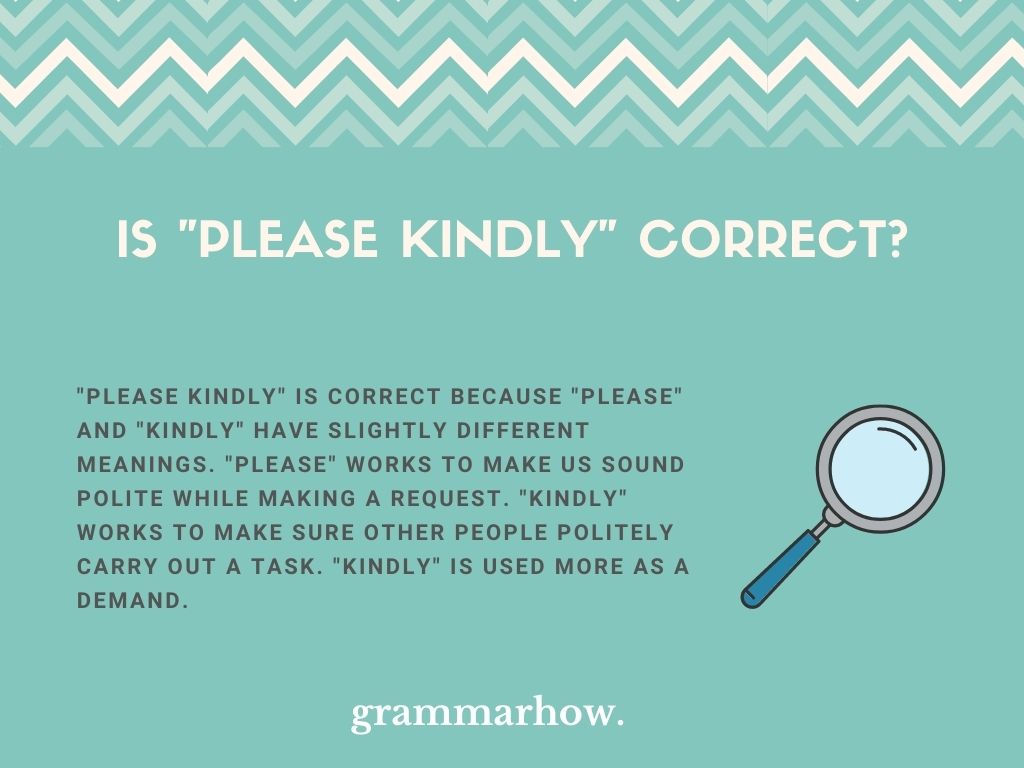“Please kindly” comes up occasionally in formal writing. However, is it a redundant phrase? After all, both “please” and “kindly” seem to be ways to request someone to complete a task. This article will explore this idea.
Is “Please Kindly” Correct?
“Please kindly” is correct because “please” and “kindly” have slightly different meanings. “Please” works to make us sound polite while making a request. “Kindly” works to make sure other people politely carry out a task. “Kindly” is used more as a demand.

To help illustrate the differences, you can look at the following examples:
- Please come to my office.
“Please” shows that we are making a request. It’s a polite request, but that’s all it is. There is no direct requirement for somebody to “come to our office” when we use this phrase.
- Kindly come to my office.
“Kindly” is more of a demand. We expect somebody to “come to our office” to talk to us. However, we expect them to do the action “kindly,” which means they should carry themselves politely.
Since the two words do not have the same meaning, the phrase “please kindly” is correct. It is not a redundant phrase, and we can use it in many cases.
Is It Correct To Use “Kindly Please”?
“Kindly please” is not correct because “kindly” should not come before “please.” It works as an intensifier, meaning that we need “please” to come first for the sentence to be intensified correctly.
You can see how it does not make sense in the following examples:
- Correct: Please kindly visit me in my office.
- Incorrect: Kindly please visit me in my office.
Many native speakers believe “kindly please” to sound far too jarring. In many cases, it does not work because the intensifier should come after the proposal or request (which is what “please” offers).
Is It Ever Correct To Use “Please” And “Kindly” Together?
You do not always have to use “please kindly” when writing them both. Sometimes, the directions or demands will come in slightly different orders. We can use both “please” and “kindly” in the same sentence without them touching each other.
Here are some examples of how that looks:
- Kindly visit my office when you get a chance, please.
- Please make sure to kindly take the bins out when you have some spare time.
While it is not common to use either of the two sentences above, they are still grammatically correct. Many people would rather stick with “please kindly” being one phrase, but there is no reason why the above structure cannot work.
To help illustrate why “please” and “kindly” are more common to see together, we’ll redo the above sentence with “please kindly” at the start.
- Please kindly visit my office when you get a chance.
- Please kindly make sure to take the bins out when you have some spare time.
As you can see, these examples are much less jarring for the reader. That’s why it’s more common to see “please kindly” together.
Examples Of How To Use “Please Kindly” In A Sentence
It might help you to see a few examples of how “please kindly” can make sense. We usually include a verb directly after the request, which you will see from the following:
- Could you please kindly check whether you can make it in tomorrow?
- Please kindly confirm that you have the time to complete this task.
- Please kindly process all the necessary paperwork before arriving later today.
- Please kindly remember to apologize for your behavior yesterday.
- Please kindly advise me on what my next steps should be for this project.
- Please kindly check that you can get this sorted in time.
- Kindly consider your neighbors when you are working from home, please.
- Please let me know if there’s anything else I can kindly do for you, and I’ll be happy to help.
As you can see, “please kindly” makes much more sense when the two words are together. While using “please” and “kindly” separately in the same sentence is still appropriate, that doesn’t mean it’s commonplace.
Better Alternatives To “Please Kindly”
Finally, let’s check out some better alternatives that you can use. There are many different ways for us to say “please kindly,” including:
- Please
- Kindly
- If you don’t mind
- If you wouldn’t mind
- If you have time
- Could you
- Would you
- Can you
- Will you
- May you

Martin holds a Master’s degree in Finance and International Business. He has six years of experience in professional communication with clients, executives, and colleagues. Furthermore, he has teaching experience from Aarhus University. Martin has been featured as an expert in communication and teaching on Forbes and Shopify. Read more about Martin here.
